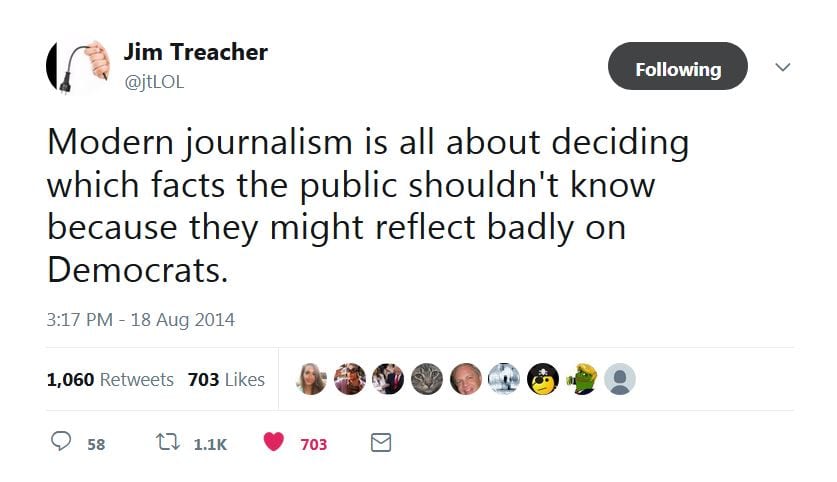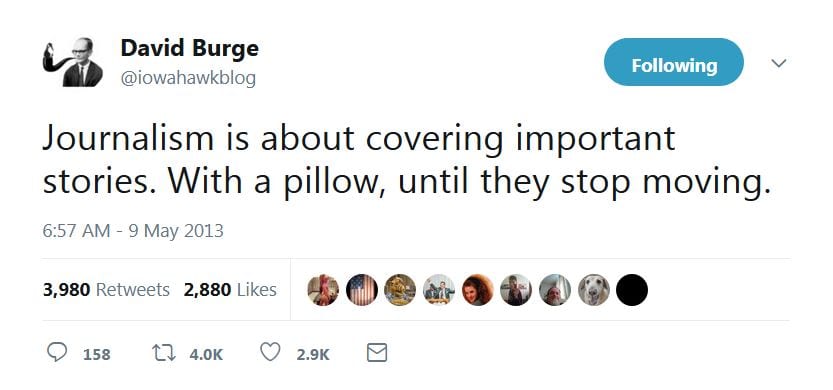BOJO UPDATE: UK Prime Minister Boris Johnson discharged from hospital.
The Associated Press apparently has mixed feelings about Johnson’s recovery: UK virus deaths top 10,000 as leader Johnson leaves hospital.
BOJO UPDATE: UK Prime Minister Boris Johnson discharged from hospital.
The Associated Press apparently has mixed feelings about Johnson’s recovery: UK virus deaths top 10,000 as leader Johnson leaves hospital.
NEW GRILLE, OLD SUV: Lexus GX460. But that’s not all bad: “Whether you prefer your SUV to feel like a truck or a lifted station wagon will determine how well the GX460 will work for you. This aging Lexus is most certainly a truck.”
ROMAN AUTHORITIES INVESTIGATING JESUS FOR VIOLATING STAY-IN-TOMB ORDER.
From the Empire’s Acta Diurna of Record, the Babylon Bee.
THE NEW YORK TIMES PROTECTS JOE BIDEN FROM SEXUAL ASSAULT ALLEGATION: “‘We found no pattern of sexual misconduct by Biden, beyond hugs, kisses, and touching that women previously said made them uncomfortable’…You couldn’t make this up. It’s like saying we investigated Genghis Khan and found no pattern of behavioral misconduct beyond all the raping and killing he committed in his decades-long invasions of China and the Western world.”
Evergreen:


“SORRY, WE DON’T GET IT EITHER.” A Man Injected Himself With His Own Semen to ‘Cure’ His Back Pain. Spoiler: It didn’t work.
I DUNNO, THE EXPERTS HAVE BEEN WRONG OVER AND OVER AGAIN ON THIS PANDEMIC: As the going gets tough, America returns to experts for help.
An invisible enemy is killing thousands and forcing people worldwide to cower behind closed doors. Unfounded conspiracy theories and miracle “cures” abound on social media. Politicians and pundits send mixed messages about how to protect yourself.
Who you gonna call?
As the coronavirus rampages, the public increasingly is turning to experts in academia and government — the educated, experienced “elites” that many Americans had tuned out.
After all, in January the experts were telling us this was no biggie. And they’ve been all over the place since. And don’t get me started on the mask-usage debacle.
Flashback: The Suicide of Expertise.
DEPENDS ON HOW CAREFUL PEOPLE ARE: Rural areas may be ’emerging hotspots’ for COVID-19, CDC figures suggest. Remember, pathogens don’t spread geographically. They spread along lines of human interaction.
IT’S ALL ABOUT FRAUD: Heed Jimmy Carter on the Danger of Mail-In Voting: ‘Absentee ballots remain the largest source of potential voter fraud.’
“Absentee ballots remain the largest source of potential voter fraud.” That quote isn’t from President Trump, who criticized mail-in voting this week after Wisconsin Democrats tried and failed to change an election at the last minute into an exclusively mail-in affair. It’s the conclusion of the bipartisan 2005 report of the Commission on Federal Election Reform, chaired by former President Jimmy Carter and former Secretary of State James Baker III.
Concerns about vote-buying have a long history in the U.S. They helped drive the move to the secret ballot, which U.S. states adopted between 1888 and 1950. Secret ballots made it harder for vote buyers to monitor which candidates sellers actually voted for. Vote-buying had been pervasive; my research with Larry Kenny at the University of Florida has found that voter turnout fell by about 8% to 12% after states adopted the secret ballot.
You wouldn’t know any of this listening to the media outcry over Mr. Trump’s remarks. “There is a lot of dishonesty going on with mail-in voting,” the president said Tuesday. In response, a CNN “fact check” declares that Mr. Trump “opened a new front in his campaign of lies about voter fraud.” A New York Times headline asserts: “Trump Is Pushing a False Argument on Vote-by-Mail Fraud.” Both claim that voter fraud is essentially nonexistent. The Carter-Baker report found otherwise.
Intimidation and vote buying were key concerns of the commission: “Citizens who vote at home, at nursing homes, at the workplace, or in church are more susceptible to pressure, overt and subtle, or to intimidation. Vote buying schemes are far more difficult to detect when citizens vote by mail.” The report provides examples, such as the 1997 Miami mayoral election that resulted in 36 arrests for absentee-ballot fraud. The election had to be rerun, and the result was reversed.
There are more recent cases, too. In 2017 an investigation of a Dallas City Council election found some 700 fraudulent mail-in ballots signed by the same witness using a fake name. The discovery left two council races in limbo, and the fraud was much larger than the vote differential in one of those races. The case resulted in a criminal conviction. . . .
It is often claimed that impossibly large numbers of people live at the same address. In 2016, 83 registered voters in San Pedro, Calif., received absentee ballots at the same small two-bedroom apartment. Prosecutors rarely pursue this type of case.
Mail-in voting is a throwback to the dark old days of vote-buying and fraud. Because of this, many countries don’t allow absentee ballots for citizens living in their country, including Norway and Mexico. Americans deserve a more trustworthy system.
Indeed.
AND EVERYBODY WAS WORRIED THAT THE CHINESE CORONAVIRUS WOULD PRODUCE RACISM AGAINST THE CHINESE: Africans in Guangzhou are on edge, after many are left homeless amid rising xenophobia as China fights a second wave of coronavirus.
The African community in Guangzhou is on edge after widespread accounts were shared on social media of people being left homeless this week, as China’s warnings against imported coronavirus cases stoke anti-foreigner sentiment.
In the southern Chinese city, Africans have been evicted from their homes by landlords and turned away from hotels, despite many claiming to have no recent travel history or known contact with Covid-19 patients.
CNN interviewed more than two dozen Africans living in Guangzhou many of whom told of the same experiences: being left without a home, being subject to random testing for Covid-19, and being quarantined for 14 days in their homes, despite having no symptoms or contact with known patients.
The move comes amid heightened media coverage of the so-called second wave of coronavirus cases, emanating from infections outside of China. Earlier this week, Chinese President Xi Jinping urged authorities to carefully watch for imported cases from other countries, state news agency Xinhua reported.
But one aspect of the data has received relatively less public attention: on March 26, Vice Minister of Foreign Affairs Luo Zhaohui said 90% of China’s imported cases held Chinese passports. . . .
On Saturday, however, the US Consulate in Guangzhou warned African-Americans to avoid travel to the city.
“In response to an increase in Covid-19 infections, officials in the Guangzhou metropolitan area escalated scrutiny of foreign nationals,” the consulate said in a statement. “As part of this campaign, police ordered bars and restaurants not to serve clients who appear to be of African origin. Moreover, local officials launched a round of mandatory tests for Covid-19, followed by mandatory self-quarantine, for anyone with ‘African contacts,’ regardless of recent travel history or previous quarantine completion.“African-Americans have also reported that some businesses and hotels refuse to do business with them.”
China is really distinguishing itself in this outbreak.
FALSE HOPE: Doctors, pols urge earlier use of ‘miracle’ coronavirus drug cocktail. “Last week, the American Society of Thoracic Surgeons issued guidelines for doctors to use the anti-malarial if they are in the advanced stages of the coronavirus, but some physicians say that it needs to be administered long before that.”
FAREWELL, MY LOVELY: A review of The Big Goodbye: Chinatown and the Last Years of Hollywood.
There’s a moment midway through the film Chinatown (1974) in which the hero, Jake Gittes, hands us a clue—not a clue about the case he’s investigating, the one involving graft and murder in L.A.’s Department of Water and Power, but a more subtextual kind of clue, hinting at the meaning of the film’s enigmatic title. Jake (Jack Nicholson) and his client, Evelyn Mulwray (Faye Dunaway), are standing in her back yard, and she’s prodding him about his life before he became a private eye, when he worked as a cop in Chinatown. What did he do there, she asks? “As little as possible,” Jake replies. This bit of dialogue may seem innocuous, but it was, in fact, the inspiration for the entire film, taken by screenwriter Robert Towne from an actual Chinatown cop, whom he met in the early 1970s. In Chinatown, the policeman explained, you have to do as little as possible, not because you’re lazy per se, but because you never know what’s going on, whether you’re preventing a crime or abetting one. Towne loved this idea, seeing it not only as a good line for a movie but a metaphor for life in Los Angeles, a place where you may think you know what’s going on, but you never really do. If he’d had his way, the film wouldn’t have had a single scene set in Chinatown. The title, he thought, spoke for itself.
Although he was already well known in Hollywood as a go-to script doctor—he had penned scenes for Bonnie and Clyde (1967) and The Godfather (1972)—Towne effectively made his name with Chinatown and has dined off its success ever since. In 1979, screenwriting guru Syd Field dubbed it the “best American screenplay written during the 1970s,” and in subsequent decades the script has made so many top-10 lists that singing its praises can now seem almost trite. Critics point out (quite rightly) that every revelation in the story is doled at precisely the right moment, pushing the plot along without ever spoiling the mystery, and that every event—indeed, every line of dialogue—serves a purpose, from Gittes’s crude jokes to his observation, in the first minutes of the film, that sometimes it’s best to “let sleeping dogs lie.” If only he’d heeded his own advice.
If you loved Chinatown (despite its being directed by a truly repugnant man), definitely read the whole thing.
BACK AND TO THE LEFT: Kathy Shaidle on Oliver Stone’s JFK.
My complaints begin with the title:
It should have been called Garrison, after the film’s “hero.” A New Orleans D.A., Jim Garrison tried and failed, in 1967, to convict some admittedly sleazy-seeming locals of being part of the “conspiracy” to assassinate Kennedy, which he theorized had been — and I can’t believe I’m forced to type this — a “homosexual thrill killing.”
Stone, and actor Kevin Costner, portray Jim Garrison as a real-life Atticus Finch, when, in reality, “[o]n the job, he was accused of using truth serums, bribing witnesses, and making promises for reduced sentences,” and “was not present at much of the trial.”
These are just my beefs with the title and the main character, and the damn thing is three and a half hours long. This fellow has compiled an extensive list of Stone’s JFK prestidigitations; while it isn’t as well sourced as I’d like, I must share my favorite:
In the film, the rifle of one of the “grassy knoll” shooters emits a cloud of smoke, but, “Stone could find no gun that emitted that much smoke, [so he] had [a] special effects man blow smoke from bellows.”
The author adds:
“Many consider this an appropriate metaphor for the entire movie.”
Indeed. If viewed as a leftwing political paranoia thriller, it’s (almost) on par with John Frankenheimer’s The Manchurian Candidate. But as history, JFK is as reliable as Stone’s later Showtime series, The Untold History of the United States.
Flashback: “Trapped In Camelot:” my interview with James Pierson, the author of Camelot and the Cultural Revolution: How the Assassination of John F. Kennedy Shattered American Liberalism.
GOOD NEWS: Boris Johnson Discharged From Hospital.
8 REASONS TO BELIEVE HE IS RISEN: The evidence is deep and persuasive for many folks of undoubted intelligence. Not so much for others. Whichever side you come down on, it’s Easter Sunday, so consider these points.